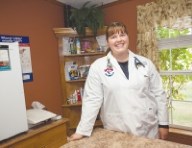A recent outbreak of Parvovirus in the district has prompted a call for owners to ensure their dogs are fully immunized.Dr. Kelsey Shacker, veterinarian at Chinook Country Veterinary Clinic in Olds, said puppies are particularly vulnerable to Parvovirus because it attacks rapidly growing cells, as in young dogs.“(Puppies) need those boosters and even in between the boosters, they're still at risk; they're just starting to get their immunity built up. So often we don't like puppies heading out to off-leash parks or interacting with strange dogs until at least that second shot,” said Shacker.Puppies can get a life-threatening intestinal illness from Parvovirus, which causes severe, vomiting, diarrhea (which can sometimes be bloody), dehydration, lethargy and causes the dog to stop eating and drinking, getting extremely weak.Parvovirus can also destroy white blood cells, which help fight infection, making animals susceptible to bacterial and other diseases at the same time. This, in turn, makes them sicker and in need of medical treatment.“Basically, they'll wither away to nothing and most likely, without treatment, die. And it's a very aggressive virus and the clinical signs can come on very quickly,” she said.Parovirus spreads very easily in fecal matter and can survive on the grass, for example, for up to a year.“The concern is your dogs go to one person's farm and it goes back to the next place, and then we have more and more outbreaks and it is a fairly large killer of puppies,” she said.It often takes a dog about five to seven days to show symptoms of Parvovirus after it has been infected, depending on how many vaccines it has had and its immune status. The clinic is currently seeing or hearing about one case every few days.“We're seeing enough at the clinic to make it a concern to want to (make the public aware). Normally, in summertime we expect to see maybe one, two in a month and we've definitely exceeded that. We're trying to control it and have the public be aware that we're seeing a higher incidence this summer than we have in previous years,” she said.“Vaccination is much cheaper than treating Parvo,” she added.Improper vaccination protocols are one reason for the increase in cases, she said.Improper protocols can be anything from not getting any shots, or getting one shot and then not following up with the required boosters, she said.Puppies should be vaccinated at eight weeks of age – not before – and receive boosters at 12 and 16 weeks of age.Shacker said some owners get the first shot but then don't follow up with the boosters. If puppies are vaccinated younger than recommended, the immunity from the vaccine can be compromised by the antibodies found in colostrum (the first milk puppies drink), and the effectiveness of the vaccine may not be optimal, she said.Exposure to stool from wild animals such as coyotes and foxes and from other dogs is also a risk factor for the disease, Shacker said.Owners need to remember that between the first and second – and even the second and third – vaccines, that their pets are still susceptible to the virus and can get sick, so owners should ensure that until fully vaccinated, they keep their puppy away from other dogs they don't know, she said.Even pets that don't go outside on a regular basis are still susceptible; if their owners unknowingly come in contact with the virus, they can transmit it to their pets via clothing, shoes or improperly washed hands.Shacker said some owners assume that if their dog is not in contact with other dogs that they do not need to be vaccinated. However, since the virus is spread through feces, any dog could come in contact with feces at any time, meaning they should be vaccinated against the virus, she said.Owners with any questions about their dog's current vaccinations, vaccination protocols, or who think their dogs may have the Parovirus, should contact their veterinarian as soon as possible, she said.



